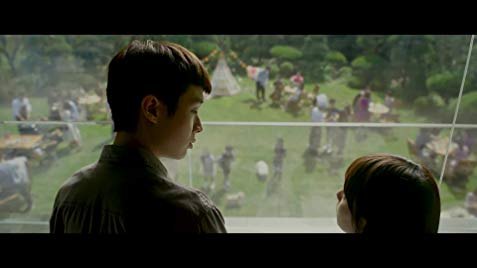
************************This review contains spoilers****************************
Times are tough as the gap between the haves and the have-nots continues to grow at rates unseen in almost 90 years. Working class people are often left scrambling to make ends meet and earn enough to support their families, often resorting to whatever means necessary to ensure that they have a roof over their heads and food on the table. Those who are of means can be oblivious to this reality, that ignorance creating a state of bliss that while comfortable in the present, may eventually blow up in their faces in an instant.
Just how fragile and potentially perilous is this delicate dance between our world’s poor and rich? Legendary South Korean director/screenwriter Bong Joon-ho explores this question in Parasite where we meet the Kim family, son Ki-woo/”Kevin” (Choi Woo-shik), daughter Ki-jung/”Jessica” (Park So-dam), mother Chung-sook (Jang Hye-jin), and father Ki-taek/”Uncle Kim” (Song Kang-ho). After Ki-woo is hired as an English tutor for Da-hye (Jung Ji-so), daughter of the wealthy Park Dong-ik (Lee Sun-kyun), he comes up with a scheme for each member of the destitute family to gradually replace the wealthy family’s current household staff and secure the well-paying jobs for themselves through false identities. As the plan comes to fruition, the Kim family soon finds themselves deep into an unweildy, unplanned for situation.
What first struck me about Parasite was its accurate depiction of an oft overlooked aspect of poverty; the ingenuity that the poor are often forced to develop due to a lack of access to resources. Ki-woo displays a clever charm from the onset of the film, quickly convincing an stern pizza chain manager to consider firing her unreliable part-time worker and hire him instead, immediately following an angry exchange she had with Chung-sook for their shoddy work folding pizza boxes. Ki-jung on the other hand is gifted in the arts, particularly computer design, and displays the same quick wit and silver tongue her brother has developed to survive. The talents displayed by the children of the Kim family represents a sobering reality within our world; that poorer people do not lack for talent, only opportunity.
While the ability of the poor to adapt and survive is admirable, the necessity of this inventiveness becomes a sort of prison, another point that Parasite brilliantly displays. This idea is presented to us metaphorically when we discover that Moon-gwang (Jeong-eun Lee), the Parks’ housekeeper that the Kim family schemes to get fired, had a scheme of her own that she has been running on the Park family; hiding her husband Geun-se (Park Myeong-hoon) in a forgotten, hidden fallout shelter within the house away from loan sharks to whom he is indebted. After a series of jaw dropping events during the film’s explosive third act, Ki-taek eventually finds himself doomed to the same fate, hiding in the bunker waiting for the moment he can emerge safely. Bong brilliantly presents the bunker as the metaphorical prison that the poor find themselves confined to throughout their lives due to the lack of income and opportunities available to them. The violent confrontations and imprisonments that we witness take places Ming the struggling characters in the secret locale calls to mind how the poor are forced to resort to fighting among each other for the small slice of the pie left behind at the table of their richer peers.
Parasite doesn’t limit it’s critique of socioeconomics to the poor, it also makes a statement about the culture of the rich and the vulnerabilities it presents. The Kims’ manipulation of the Parks is successful because the poorer family uses the tendency of the rich to avoid confrontation or make waves, and their disposable view of the working class, to their advantage. Their plots to displace the Parks’ original driver and nanny relies on their hesitancy to directly confront and ask their workers about their health or behavior so as not to rock the boat and keep up appearances. This commitment of the wealthy to always appearing perfectly coiffed made the Parks susceptible to being exploited, as did their view of longtime, well-behaved employees as easily replaceable. The events that unfold in the film after the Kims’ deception could have been avoided had the Parks valued and trusted their original employees instead of viewing them as easily replaceable. The issue of employers not valuing their employees is one that is especially relevant in our time and is well explored in this film.
Parasite’s plot features various expertly executed twists and turns that serve as a testament to Bong Joon-ho’s phenomenal direction and co-writing. The gradual manipulation of the Parks by the Kims is so well portrayed and laid out onscreen, as they slowly attach themselves to the family for their own benefit like a parasite to its host. The way that tension is presented in the film is extremely visceral and genuine; I was brought to the point of palpable discomfort and dread at various points while watching. The strength of Parasite is its compelling story and that can be credited to the film-making prowess of its legendary director. The social commentary within the film is notable and relevant to our current reality, but aside from what it says about societal issues, what makes Parasite so worthwhile is that it is simply a great time at the movies. You’ll be made to smile and laugh throughout, sit with your jaw hanging on the floor, and then be left to ponder the world around you. This type of well rounded, emotional and thoughtful experience is what film viewing should be and what the modern age of cinema desperately needs more of.
Image: NEON

